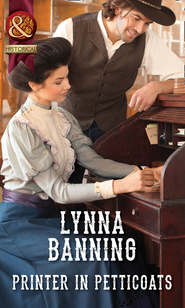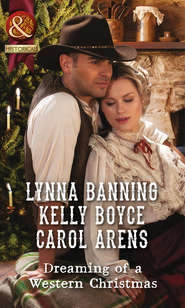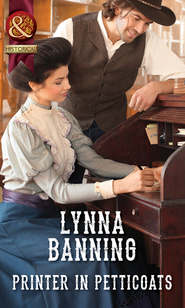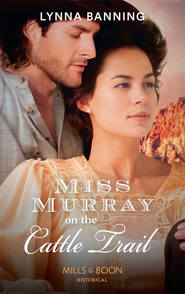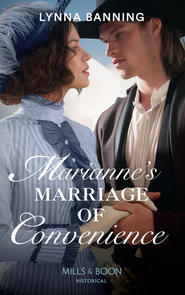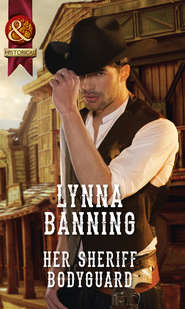По всем вопросам обращайтесь на: info@litportal.ru
(©) 2003-2025.
✖
Smoke River Bride
Настройки чтения
Размер шрифта
Высота строк
Поля
But seeing another woman in her place sent a blade through his gut. It wasn’t that he regretted marrying Leah—just that he regretted losing Hattie.
Teddy clattered down the ladder and slouched toward the kitchen table. “I spose you want me to set out the plates,” he grumbled.
Leah turned to look at him. “Yes, thank you, Teddy. That would be nice.”
“Don’t have enough chairs, Pa. Guess she’ll have to sit on that old nail keg, huh?”
Thad met Leah’s questioning eyes and to his relief saw that she was amused, not angry. She clapped her hand over her mouth to keep from laughing. Teddy’s suggestion of the nail keg even brought a chuckle to his own throat.
“Well, son, you have two choices. Either you cobble up an extra chair or you eat your dinner standing up. Leah and I are sitting at the table.”
“Aw, Pa.”
“Don’t ‘Aw, Pa’ me, Teddy. Take it or leave it. I’d tan your hide good if it wasn’t our wedding day.”
Teddy said nothing, but Thad noted that he dutifully laid three plates on the table and then disappeared.
“Hunting up a chair, I’d guess,” he murmured at Leah’s back. She’d found one of Hattie’s aprons and tied it twice around her waist in an oversize, floppy bow. His heart gave an odd lurch at the sight. Dammit, he remembered that apron. Oh, God, he wished it was Hattie there at the stove.
But it wasn’t Hattie, it was Leah. His new wife. Dammit, he could hardly bring himself to say the word. He focused on her slim figure and felt a flicker of warmth. He hadn’t necessarily expected to like his mail-order bride and now the woman was his wife.
He didn’t have to like her, he told himself; all he had to do was get along with her.
The front door banged open and in stomped Teddy, dragging a dust-coated, straightbacked wooden chair. “Found it in the barn,” he muttered.
Thad squeezed his thin shoulder. “Well done, Teddy.”
“I hope it breaks when she sits on it!”
Thad bent and tipped his son’s chin up with his forefinger. “No, you don’t, Teddy. Things are plenty difficult for all of us right now, so you’ll hold your tongue. From now on, if you want to say anything about my wife, you say it directly to Leah, understand?”
“Okay.” Teddy sucked in a breath and sent a venomous look at her back. “I don’t like you, Leah.”
Thad grabbed the boy by his shirt collar, then heard Leah’s calm voice offer a retort he could not have predicted with a crystal ball.
“I do not like you either, Teddy.”
The boy’s mouth dropped open. “Huh? How come?”
“Because,” Leah said, turning to face him, “the things you say hurt my feelings.”
Thad blinked, then caught Leah’s steady gaze. He raised his eyebrows and gave his new wife as much of a smile as he could muster.
In an agony of unease, Leah watched Thad and Teddy seat themselves at the wooden kitchen table. She poured Teddy a glass of fresh milk from the pail Thad had brought in, then filled Thad’s china cup with coffee that suddenly looked too black and too thick. Thad reached his spoon to the milk glass, dipped some out and dribbled it into the cup. Now it looked like water from a mud puddle.
Teddy poked his fork at his father’s cup. “That sure looks awful.”
Leah’s face grew hot. “I have never made coffee before,” she confessed. “In China we drink tea.”
Hiding her face, she gathered up the three plates and whisked them over to the stove, where the skillet rested with her steaming dinner dish. There was no wok, so she had used the iron frying pan to cook in. She scooped a large dollop of the mixture onto each plate.
She placed Teddy’s dinner before him. The boy wrinkled his nose. “What’s that stuff?”
“That is called chow fun. It means ‘vegetables with noodles.’ In China, we make it with chicken.”
“Eww,” Teddy muttered.
Leah tried to see the dish through the eyes of a young American boy: a pile of thinly shaved potatoes covered with fried onions and topped with crumbled bacon. Of course, some ingredients were missing—not just chicken, but the noodles, crisp green peapods and a dribble of plum sauce. In China, the dish was special; here in Oregon it was obviously not.
Teddy dropped his fork and laid his forehead on the table next to his plate. “I can’t eat it, Pa.”
“Nobody’s pushing you, son.” Thad jammed his own fork into the mound on his plate and purposefully shoved a bite into his mouth. The apprehensive look on his face faded to surprise.
“Not bad,” he said. “Pretty good, in fact.” He gobbled another bite, then another. Leah ate quietly beside him, noting that he took only one tiny sip of the coffee she had made. Her throat tightened.
For dessert she had baked a traditional Chinese tart made of layered apple slices, but now she hesitated to present it. She would never understand American cooking. She feared she would never fit into American life no matter what she learned to cook. Finally she gathered up her courage, set the tart in front of Thad and handed him a knife to slice it into wedges.
The tart met with a broad grin from Thad and a glimmer of interest from Teddy. At least he tasted a bite. Then, without a word, he wolfed down his portion of the intricately assembled creation and held out his plate for another piece.
“Good!” Thad pronounced. Teddy said nothing, just sat staring at the empty tart pan. “Mama used that pan to flour the chicken before she fried it.”
“Oh? What does ‘flour the chicken’ mean?”
Teddy smirked. “You don’t know nuthin’, do ya? You take a chicken leg and roll it around till it’s all floury and then you fry it.”
“Could you show me?”
“Uh, I guess so, if I—I have to,” the boy stammered. “Maybe tomorrow.”
“Tomorrow’s Monday, son. Don’t forget school.”
Leah looked up. “I would like to walk to school with you tomorrow, Teddy.”
“What for? You need to learn somethin’?”
“Oh, yes. There is much for me to learn about life in America. But that is not what I meant.”
“Miz Johnson doesn’t teach that stuff, ’cuz we already know it,” Teddy snapped.
“Teddy,” Thad said in a warning voice.
“I wish to meet your teacher, Teddy.”
“Leah,” Thad warned, “the schoolhouse is a three-mile walk.”
“An’ if it snows, Pa takes me on his horse. I bet you can’t even ride a horse.”
“No, I cannot. But I am used to walking. My father’s school was two miles from our house, and I walked there every day, even in the snow.”






